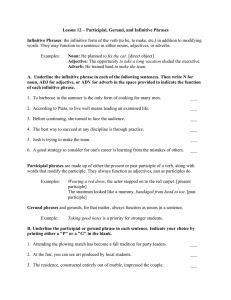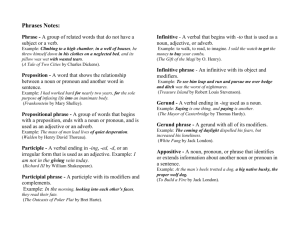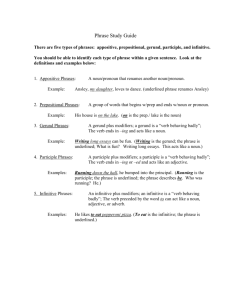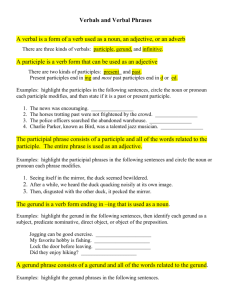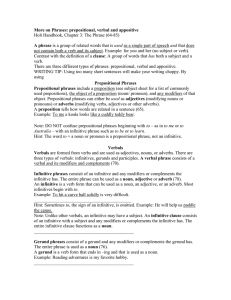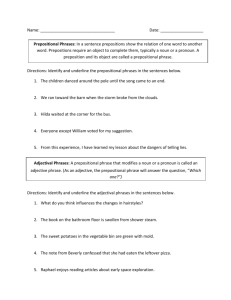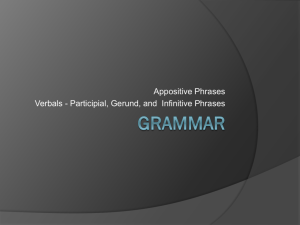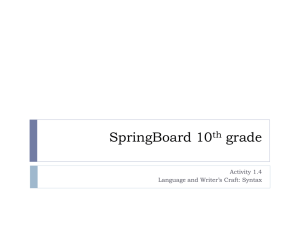More on Phrases: prepositional, verbal and appositive A phrase
advertisement
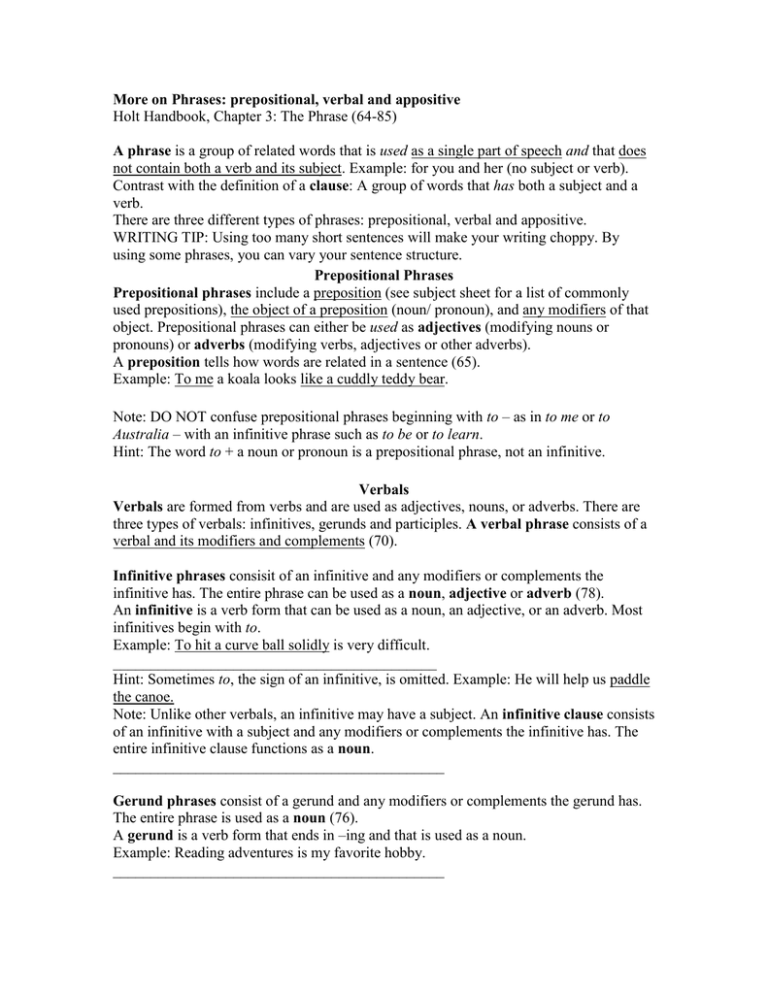
More on Phrases: prepositional, verbal and appositive Holt Handbook, Chapter 3: The Phrase (64-85) A phrase is a group of related words that is used as a single part of speech and that does not contain both a verb and its subject. Example: for you and her (no subject or verb). Contrast with the definition of a clause: A group of words that has both a subject and a verb. There are three different types of phrases: prepositional, verbal and appositive. WRITING TIP: Using too many short sentences will make your writing choppy. By using some phrases, you can vary your sentence structure. Prepositional Phrases Prepositional phrases include a preposition (see subject sheet for a list of commonly used prepositions), the object of a preposition (noun/ pronoun), and any modifiers of that object. Prepositional phrases can either be used as adjectives (modifying nouns or pronouns) or adverbs (modifying verbs, adjectives or other adverbs). A preposition tells how words are related in a sentence (65). Example: To me a koala looks like a cuddly teddy bear. Note: DO NOT confuse prepositional phrases beginning with to – as in to me or to Australia – with an infinitive phrase such as to be or to learn. Hint: The word to + a noun or pronoun is a prepositional phrase, not an infinitive. Verbals Verbals are formed from verbs and are used as adjectives, nouns, or adverbs. There are three types of verbals: infinitives, gerunds and participles. A verbal phrase consists of a verbal and its modifiers and complements (70). Infinitive phrases consisit of an infinitive and any modifiers or complements the infinitive has. The entire phrase can be used as a noun, adjective or adverb (78). An infinitive is a verb form that can be used as a noun, an adjective, or an adverb. Most infinitives begin with to. Example: To hit a curve ball solidly is very difficult. ___________________________________________ Hint: Sometimes to, the sign of an infinitive, is omitted. Example: He will help us paddle the canoe. Note: Unlike other verbals, an infinitive may have a subject. An infinitive clause consists of an infinitive with a subject and any modifiers or complements the infinitive has. The entire infinitive clause functions as a noun. ____________________________________________ Gerund phrases consist of a gerund and any modifiers or complements the gerund has. The entire phrase is used as a noun (76). A gerund is a verb form that ends in –ing and that is used as a noun. Example: Reading adventures is my favorite hobby. ____________________________________________ Note: Gerunds, like present participles, end in –ing. DO NOT confuse a gerund, which is used as a noun, with a present participle, which may be used as adjective or as part of a verb phrase. ____________________________________________ Participial phrases consist of a participle and any modifiers or complements the participle has. The entire phrase is used as adjective (71). A participle is a verb form that can be used as adjective. Present participles end in –ing while past participles end in –d or –ed. Example: For dinner we prepared grilled salmon. Some may be formed irregularly. Example: For years the treasure remained hidden under tons of rock. ____________________________________________ Note: Do not confuse a participle used as an adjective with a participle used as part of a verb phrase. Note: When placed at the beginning of a sentence, a participial phrase is followed by a comma. ____________________________________________ Appositives An appositive phrase consists of an appositive and any modifiers it has. Example: The Millers live on Mockingbird Lane, a wide street lined with oak trees (81). An appositive is a noun or pronoun placed beside another noun or pronoun to identify or describe it. Example: My cousin Bryan is my best friend. ______________________________________________ Hint: An appositive phrase usually follows the noun or pronoun it identifies or describes. Sometimes, though, it precedes the noun or pronoun. Note: Appositives and appositive phrases that are not essential to the meaning of a sentence are set off by commas. However, an appositive that tells which one of two or more is essential to the meaning of a sentence and should not be set off commas. _______________________________________________
